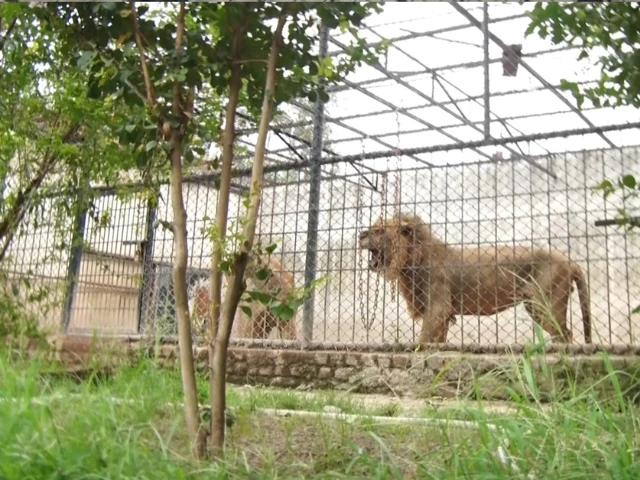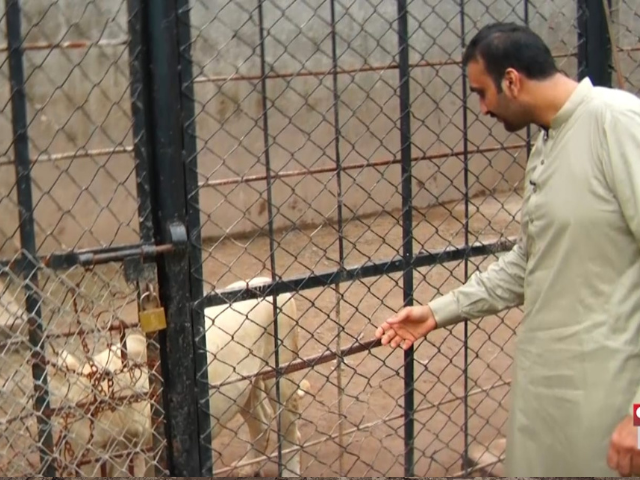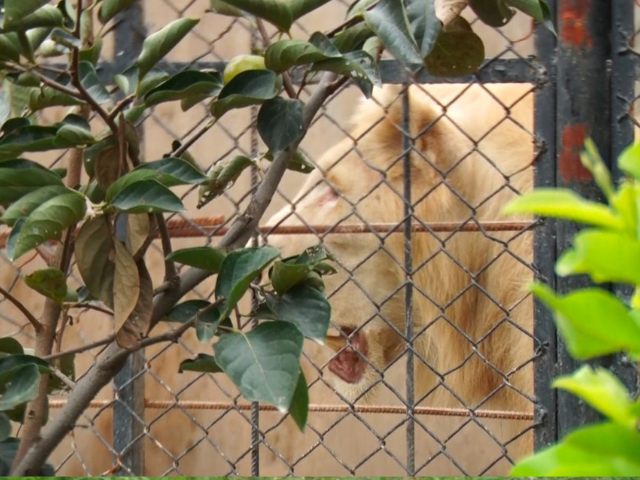Punjab breeders call for big cat permits similar to zoos
Officials contend zoos, rehabilitation centres occupy large areas of land with better facilities than private farms

Private breeding facilities in cities are being shut down following Punjab cabinet’s January 16, 2025 decision banning lions, tigers, leopards, and jaguars in urban residential areas.
So far, 27 big cats have been taken into the custody of the Wildlife Department.
Officials say taking measure is necessary for public safety and animal welfare, in line with international standards.
Government should regulate and commercialize the sector instead of imposing a blanket ban, farm owners argued.
"Breeders were not consulted during policymaking," said Mian Umar Dola, a farm owner who has been breeding big cats for 17 years and operates a facility in Lahore’s Sabzazar area.
Read: Law tweaks okayed to protect big cats

A lion kept in a cage at private facility in Lahore before Punjab’s ban on big cats in urban areas. Photo: Express
“Keeping lions in small houses or on rooftops is unsafe, but owners with sufficient space and safety measures should be allowed,” he said.
"Large carnivores can be housed in the heart of the city, so private breeders under strict conditions should also be permitted."
"Despite two decades of big cat breeding in Pakistan, no human casualties have occurred," contended Dola.
LPG cylinders and dog bites kill people every year, yet neither is banned, he added.
According to him, Pakistan ranks second or third worldwide in big cat breeding, country could generate foreign exchange through exports with government support.
Lionesses sometimes reject their cubs, forcing breeders to hand-feed them to ensure survival, he added.
Zoos also raise cubs on artificial milk and food, but its treated as crime when private breeders do the same, opined the farm owner.
Read more: Punjab to ban sale and begin sterilization of privately owned big cats
He suggested cubs up to six months old should legally be allowed in private care.
Punjab Additional Chief Wildlife Ranger Syed Kamran Bukhari said the ownership and breeding of large wild animals must follow the standards of the World Association of Zoos and Aquariums (WAZA).
Based on these guidelines, the new policy requires farms to be registered only if they meet standards for land size, enclosure dimensions, safety protocols, and need to be outside urban settlements.
Government zoos provide open enclosures, three-tier security, and veterinary facilities, conditions nearly impossible for private facilities, he said.
Only federal government has authority to allow animal exports, noted Bukhari.
According to WAZA standards, big cat enclosures must be at least 12 feet high, or 16 feet if roofless with protective wiring or an overhang.
A two-meter gap between animals and public is mandatory, along with shaded areas, scratching structures, and indoor shelters for extreme weather or illness.
Double-gate systems and trained staff are also required.
These measures are designed to ensure public safety and preserve natural animal behaviors.
Animal rights groups have also expressed concerns.

A lion kept in a cage at private facility in Lahore before Punjab’s ban on big cats in urban areas. Photo: Express
"Confining lions and tigers to small cages causes physical and psychological harm," said activist Aneeza Khan Umrzai.
Also read: Punjab home to 587 privately owned big cats
"Small breeding farms fail to provide adequate space or veterinary care, endangering the animals’ survival."
Orgaizations such as World Animal Protection and WAZA emphasize conserving natural habitats rather than promoting commercial captivity, said animal rights lawyer Izzat Fatima.
Lions and tigers born in captivity cannot be released into the wild.
These facilities should be limited to research and educational purposes.
The Punjab government maintains its decision reflects safety concerns and compliance with international standards.
Breeders continue to call for regulated permissions and animal welfare groups insist on strict limitations to safeguard big cats.




















COMMENTS
Comments are moderated and generally will be posted if they are on-topic and not abusive.
For more information, please see our Comments FAQ